Zusammenfassung
In diesem Essay wird der Einfluss der internationalen Medien auf den Zusammenbruch der kommunistischen Regime in Ungarn und Rumänien erörtert. Dazu wird im Folgenden eine Analyse auf drei Ebenen angestrebt, die Kurz- und Langzeitprozesse berücksichtigt und auf dem Konzept der Kommunikation und dem der Propaganda basiert. Kommunikation wird hier verstanden als eine Übermittlung sachlicher, direkter Informationen, die gewisse ethische Prinzipien berücksichtigt. Propaganda bezieht sich auf die Massenüberzeugung, d.h. auf die Rolle der Kommunikation während des Kalten Krieges, auf psychologische Kriegsführung und auf den starken Gegensatz zwischen pro-demokratischer und „roter“ Propaganda. In Anbetracht der Beschränkung der Analyse auf zwei Ländern wird sich die hier angestrebte Untersuchung auf den internationalen Rundfunk in den Sprachen Mittelosteuropas konzentrieren.
Access this chapter
Tax calculation will be finalised at checkout
Purchases are for personal use only
Preview
Unable to display preview. Download preview PDF.
Literatur
Antonesei, Liviu (1995): Jurnal din anii ciumei 1987–1989. Încercǎri de sociologie spontanǎ (Diary from the plague years, 1987–1989. Attempts at a spontaneous sociology). Iaşi: Editura Polirom.
Baghiu, Aurel (1995): Printre gratii (Through the bars). Cluj: Editura Zamolxis.
Bernard, Noel (1991): Aici e Europa Liber‹ (This is Radio Free Europe). Bucharest: Tinerama.
Bozóki, András (ed.)(2002): The Roundtable Talks of 1989. The Genesis of Hungarian Democracy - Analysis and Documents. Budapest: Central European University Press.
Bozóki, András (1995): Hungary's Road to Systemic Change. The Opposition Roundtable. In: Béla K. Király (ed.): Lawful Revolution in Hungary, 1989-94. Boulder: Social Science Monographs, 61–92.
Carp, Mircea (1997): “Vocea Americii” în România, 1969–1978 (“Voice of America” in Romania, 1969–1978). Iaşi: Polirom.
Cǎlinescu, Matei/Tismǎneanu, Vladimir (1991): The 1989 Revolution and the Collapse of Communism in Romania. In: Vlad Georgescu: The Romanians. A History. Columbus: Ohio State University Press, 279–297.
Câmpeanu, Pavel (1994): România. Coada pentru hranǎ—Un mod de viaţǎ (Romania. Queuing for food—A lifestyle). Bucharest: Editura Litera.
Dahrendorf, Ralf (1990): Reflections on the Revolution in Europe. London: Chatto & Windus.
Darnton, Robert (1991): Berlin Journal, 1989–1990. New York: W. W. Norton & Company.
Deletant, Dennis (1999): Communist Terror in Romania. Gheorghiu-Dej and the Police State, 1948–1965. New York: St. Martin's Press.
Feher, Ferenc et al. (1983): Dictatorship over Needs. Oxford: Basil Blackwell.
Gabanyi, Anneli Ute (2000): The Ceauşescu Cult. Bucharest. The Romanian Cultural Foundation Publishing House.
Gerő, András/ Pető, Iván (1999): Unfinished Socialism. Pictures from the Kádár Era. Budapest: Central European University Press.
Gogea, Vasile (1996): Fragmente salvate, 1975–1989 (Saved fragments, 1975–1989). Ia¼i: Editura Polirom.
Goma, Paul (1993): Culoarea curcubeului '77. Cutremurul oamenilor (The colour of the rainbow '77. The earthquake of the people). Oradea: Editura Multiprint.
Gothár, Péter (1981): Megáll az idő (Time stands still), 105 min.
Kennedy, Michael D. (1991): Professionals, Power and Solidarity in Poland. A Critical Sociology of Soviet-Type Society. Cambridge: Cambridge University Press.
Kolakowski, Lezsek (1978): Main Currents of Marxism, vol. 3, The Breakdown. Oxford: Oxford University Press.
Korbonski, Andrzej (1983): Dissent in Poland, 1956-76. In: Jane Leftwich Curry (ed.): Dissent in Eastern Europe. New York: Praeger Publishers, 25–47.
Litván, György, (ed.)(1996): The Hungarian Revolution of 1956. Reform, Revolt and Repression 1953–1963. London: Longman, 1996.
Lovinescu, Monica (2001): La apa Vavilonului/ 2, 1960–1980 (To Vavilon's water/2, 1960–1980). Bucharest: Humanitas.
Lungu, Corneliu Mihai/Retegan, Mihai (eds.)(1996): 1956—Explozia. Percepþii rom‰ne, iugoslave ¼i sovietice asupra evenimentelor din Polonia ¼i Ungaria (1956—The explosion. Romanian, Yugoslav and Soviet perceptions of the events of Poland and Hungary). Bucharest: Univers Enciclopedic.
Milin, Miodrag, (ed.)(1999): Timişoara în arhivele “Europei Libere””—17-20 Decembrie 1989 (Timişoara in the archives of Radio Free Europe—17-20 December 1989). Bucharest: Fundaţia Academia Civicǎ.
Milin, Miodrag (1997): Timişoara în revoluţie şi dupǎ (Timişoara in revolution and after). Timişoara: Editura Marineasa.
Mitu, Sorin et al.(1999): Istorie (History). Bucharest: Editura SIGMA.
Pelin, Mihai (ed.)(1999): Operaţiunile “Meliţa” şi “Eterul.” Istoria Europei Libere prin documente de Securitate (The “Meliţa” and “Eterul” operations. Radio Free Europe's history through documents of the Securitate). Bucharest: Editura Albatros.
Petrescu, Dan/Cangeopol, Liviu (2000): Ce-ar mai fi de spus. Convorbiri libere într-o ţarǎ ocupatǎ (What remains to be said. Free conversations in an occupied country). Bucharest: Editura Nemira.
Sproule, Michael J. (1997): Propaganda and Democracy. The American Experience of Media and Mass Persuasion. Cambridge: Cambridge University Press.
Stokes, Gale (1993): The Walls Came Tumbling Down. The Collapse of Communism in Eastern Europe. New York: Oxford University Press.
Stroescu-Stînişoarǎ, Nicolae (1994): În zodia exilului. Fragmente de jurnal (Under the sign of exile. Pieces of a diary). Bucharest: Editura “Jurnalul Literar.”
Tǎnase, Stelian (1995): Ora oficialǎ de iarnǎ. Jurnal (The official wintertime. A Diary). Iaşi: Institutul European.
Tökés, Rudolf L. (2000): Elites and the Use and Abuse of Democratic Institutions. In: John Highley and György Lengyel (eds.): Elites after State Socialism. Theories and Analysis. Lanham: Rowman & Littlefield, 71–85.
Urban, George R. (1997): Radio Free Europe and the Pursuit of Democracy. My War Within the Cold War. New Haven: Yale University Press.
Verdery, Katherine (1996): What Was Socialism, and What Comes Next? Princeton: Princeton University Press.
Wolfe, Bertram D. (1957): Khrushchev and Stalin's Ghost. Text, Background and Meaning of Khrushchev's Secret Report to the Twentieth Congress on the Night of February 24-25, 1956. New York: Frederick A. Praeger.
Author information
Authors and Affiliations
Editor information
Editors and Affiliations
Rights and permissions
Copyright information
© 2010 VS Verlag für Sozialwissenschaften | Springer Fachmedien Wiesbaden GmbH
About this chapter
Cite this chapter
Petrescu, D. (2010). Die internationalen Medien und der Zusammenbruch des Kommunismus in Ungarn und Rumänien: Eine vergleichende Analyse. In: Pollack, D., Wielgohs, J. (eds) Akteure oder Profiteure?. VS Verlag für Sozialwissenschaften. https://doi.org/10.1007/978-3-531-92462-5_9
Download citation
DOI: https://doi.org/10.1007/978-3-531-92462-5_9
Publisher Name: VS Verlag für Sozialwissenschaften
Print ISBN: 978-3-531-15576-0
Online ISBN: 978-3-531-92462-5
eBook Packages: Humanities, Social Science (German Language)

